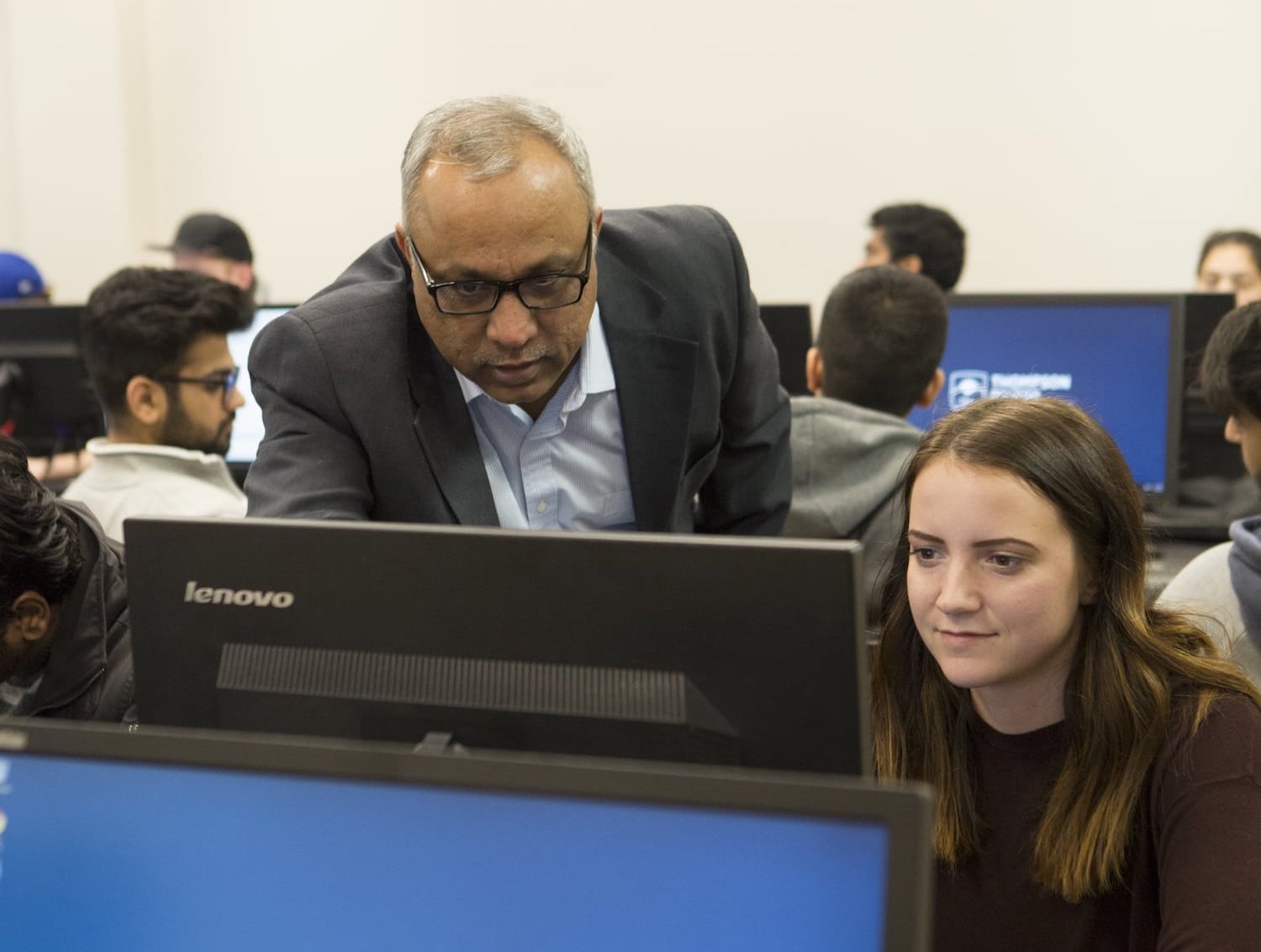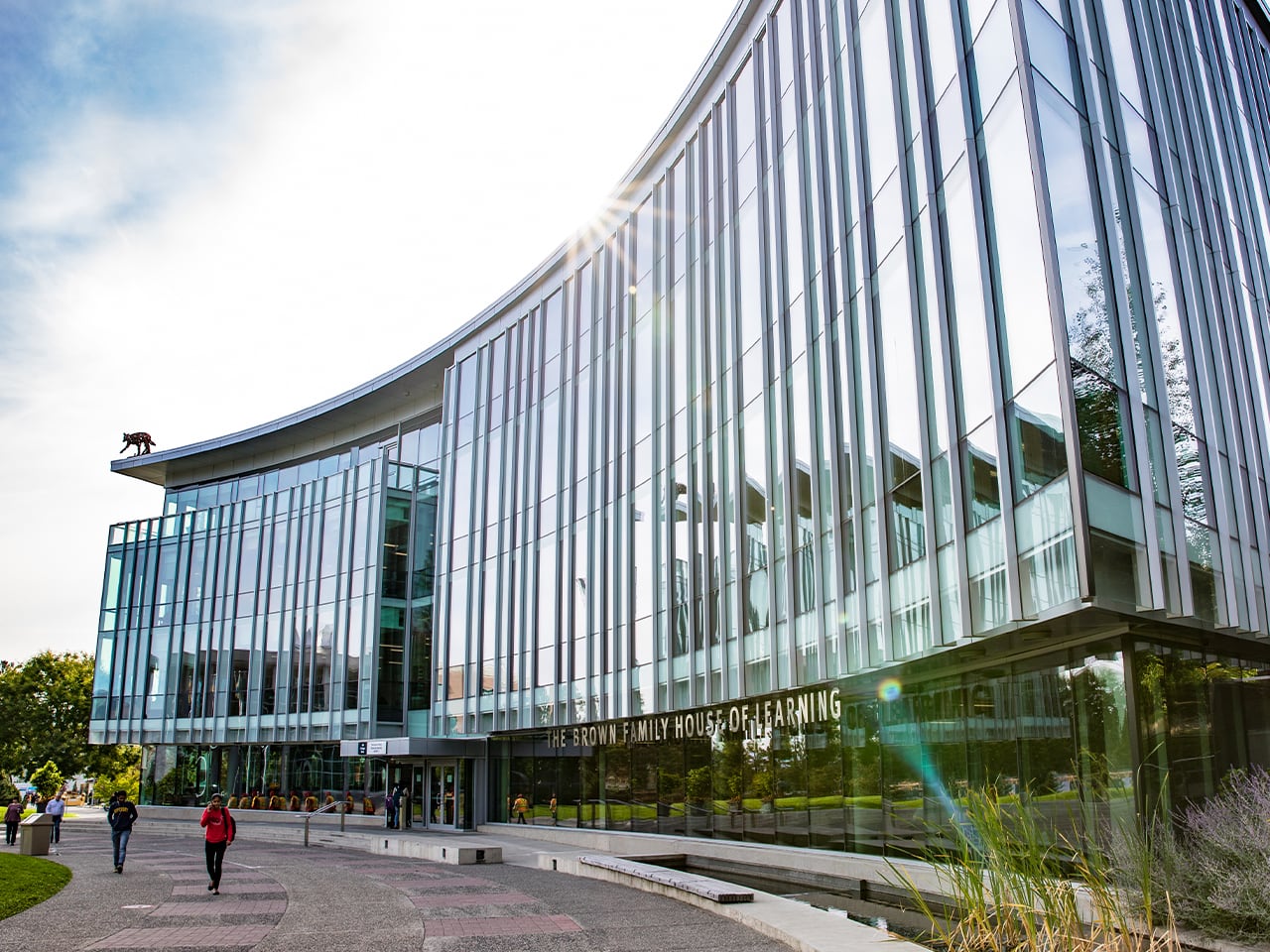Be at the forefront of technological advances that impact how we work, play and live.
With a degree in computing science you can turn concepts like self-driving vehicles, smart tech wearables and holographic surgery into everyday realities. Nearly every industry needs digital technology to succeed, which means computing science is full of opportunities in medicine, entertainment, aerospace, sports, green energy or heavy industry, just to start. By understanding the logic and algorithms that drive technology, you will begin to see opportunities everywhere.
Why choose computing science at TRU?
This degree consists of two years of general study followed by two years of concentrated studies in computing science. It is an excellent option to build a diverse set of skills.
Complete a co-op work term, and you will gain valuable industry experience and put what you learn into practise in the real world. And TRU offers opportunities for our degree students to participate in undergraduate research, which allows you to grow both your resume and academic credentials while completing your degree.
What will I learn?
Will need to discuss with Faculty-possible examples:
- Website design and development
- Programming
- Data structure and analysis

Where will this take me?
This Bachelor of Computing Science (BCS) offers several pathways to the field of computing science, including a double degree option, laddering from a diploma, and a direct path from other areas, including Arts and Business.
- Ladder a 2- or 3-year computing science diploma the degree.
- Combine your studies in arts or business studies with a Computing Science Minor
- Upgrade your skills to enhance your resumé without starting your education from scratch.
- Already working in the industry? Complete individual courses for professional development.
-
100% said the program helped them to write clearly and speak effectively
-
98% of graduates surveyed were working full-time
-
84% were in a job related to their program
-
93% were satisfied with the program
*Source: BC Student Outcomes https://www2.gov.bc.ca/gov/content/data/statistics/people-population-community/education-training/bc-student-outcomes.
Years 1 and 2
| 1 | COMP 1130 | Computer Programming I |
| 2 | COMP 1230 | Computer Programming II |
| 3 | MATH 1700 | Discrete Structures |
| 4 | MATH 1650 | Mathematics for Computing Science |
| 5 | COMP 2130 | Introduction to Computer Systems |
| 6 | COMP 2230 | Data Structure, Algorithm Analysis and Design |
| 7 | COMP 2160 | Mobile-I |
| 8 | COMP 2680 | Website Design and Development |
| 9 | COMP 2210 | Programming Methods |
| 10 | COMP 2920 | Software Architecture and Design |
| 11 | ENGL 1100 | Composition |
| 12 | CMNS 1290 | Professional Writing |
| 13 | Non-Science Elective | |
| 14 | Non-Computing Elective | |
| 15 | Non-Computing Elective | |
| 16 | Non-Computing Elective | |
| 17 | General Elective Open | |
| 18 | General Elective Open | |
| 19 | General Elective Open | |
| 20 | General Elective Open |
Years 3 and 4
| 1 | COMP 3260 | Computer Network Security |
| 2 | COMP 3270 | Computer Networks |
| 3 | COMP 3410 | Operating Systems |
| 4 | COMP 3450 | Human Computer Interaction Design |
| 5 | COMP 3540 | Advanced Web Design and Programming |
| 6 | COMP 3610 | Database Systems |
| 7 | COMP 3710 | Artificial Intelligence |
| 8 | COMP 3520 | Software Engineering |
| 9 | COMP 4910 | Computer Science Project |
| 10 | COMP XXXX | 3000-4000 Level Computing Elective |
| 11 | COMP XXXX | 3000-4000 Level Computing Elective |
| 12 | COMP XXXX | 3000-4000 Level Computing Elective |
| 13 | COMP XXXX | 3000-4000 Level Computing Elective |
| 14 | COMP XXXX | 3000-4000 Level Computing Elective |
| 15 | General Elective Open Upper Level | |
| 16 | General Elective Open | |
| 17 | General Elective Open | |
| 18 | General Elective Open | |
| 19 | General Elective Open | |
| 20 | General Elective Open |
Open admission
First year entry
- Grade 12 (or equivalent) or mature student status
- English Studies 12/English First Peoples 12 with a minimum of 73% (or equivalent)
- Pre-calculus 12 or Foundations of Math 12 with a minimum of C+, within the last two years (or equivalent)
Career Options / Laddering options
Career outcomes
Nearly all industries need computing science grads. The TRU BCS mainly concentrates on small to medium business environments. Graduates have gone on to have careers in the following sectors:
- Health care
- Manufacturing
- Communications
- Retail and ecommerce
- Banking and finance
- Electronics and entertainment
Related programs
- Computing Science Diploma
- Bachelor of Science, Major in Computing Science
- Bachelor in Computing Science and Mathematics Combined Major
- Bachelor of Computing Science and Bachelor of Business Administration (double degree)
- Bachelor of Science, minor in Computing Science
- Associate of Science
Program Details
- Credential
- Bachelor of Computing Science
- Delivery
- Kamloops
- Length
- Four years
- Intake dates
- September, January, May
- Applications
- Now accepting applications
- International
- Open to international applicants



